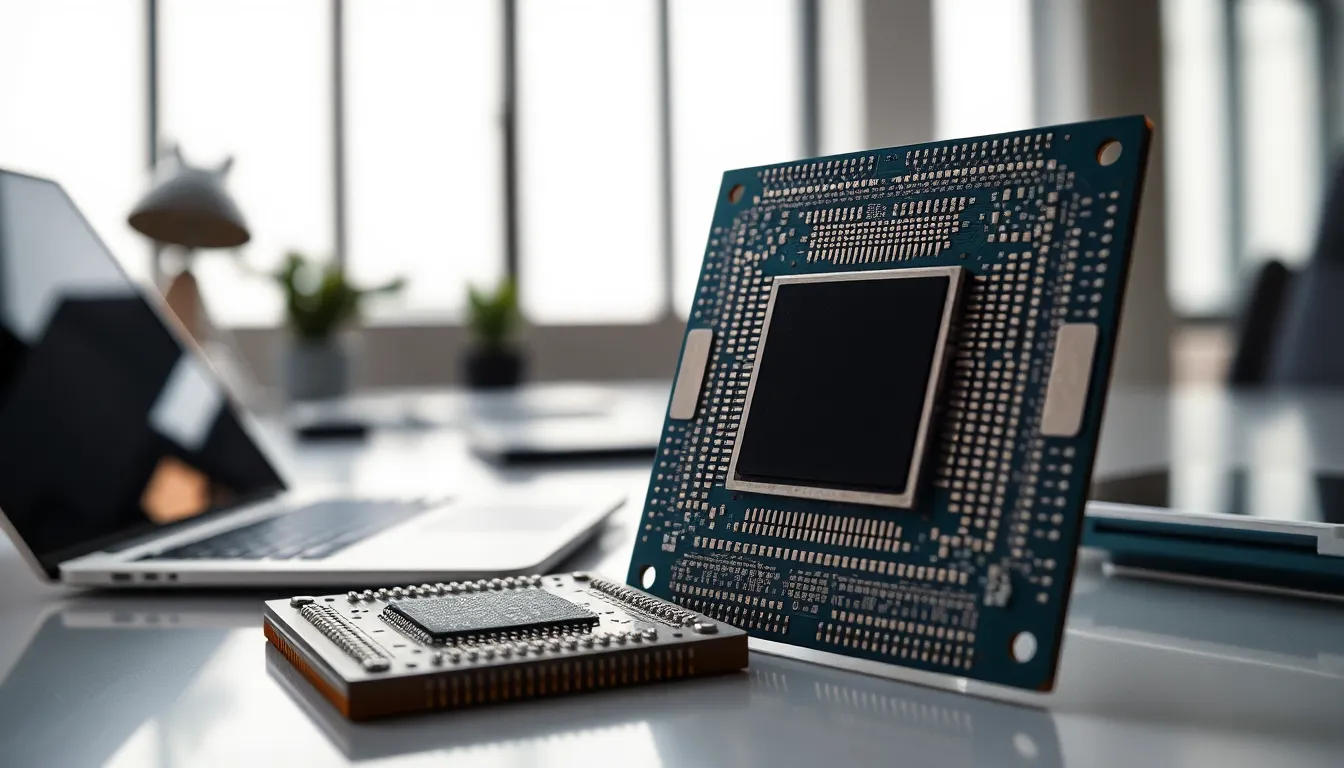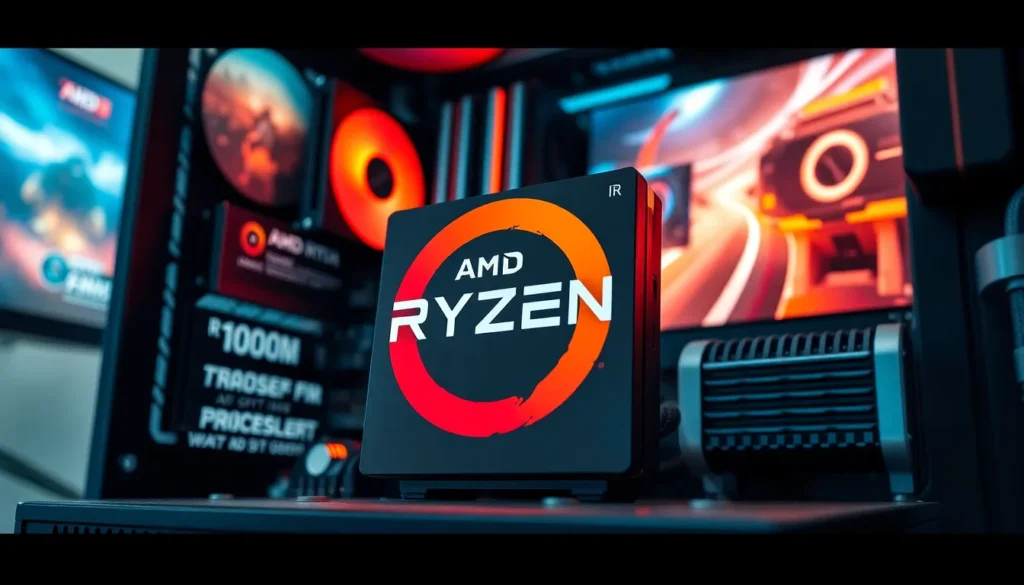Table of Contents
ToggleIn a world where speed is king and multitasking is the royal decree, powerful processors reign supreme. These tech titans are the unsung heroes behind every smooth video stream, lightning-fast game load, and seamless work-from-home experience. Imagine trying to juggle flaming swords while riding a unicycle—without a powerful processor, that’s exactly how your computer would feel during a simple task.
Overview Of Powerful Processors
Powerful processors significantly impact performance across various applications. These processors enable seamless multitasking, allowing users to run multiple applications simultaneously without noticeable lag. A common feature among advanced processors is their ability to handle complex calculations swiftly, making them suitable for gaming, video editing, and graphic design tasks.
Modern processors, such as those from the AMD Ryzen and Intel Core series, integrate numerous cores and threads. AMD processors typically offer more cores, beneficial for tasks requiring parallel processing. Intel processors often excel in single-core performance, ensuring responsive interaction in everyday applications.
High clock speeds are essential in assessing their capabilities. For instance, processors with clock speeds exceeding 4 GHz deliver enhanced performance, particularly in gaming where frame rates are critical. Additionally, technologies like Turbo Boost or Precision Boost allow processors to automatically increase clock speeds under demanding workloads, optimizing performance.
Graphics processing units (GPUs) also work closely with powerful processors, enhancing visual performance in gaming and rendering tasks. Integrated graphics in modern processors reduce the need for separate GPU units in less demanding scenarios, offering a cost-effective solution for casual users.
Powerful processors support the latest instruction sets, which enhances efficiency in software execution. Systems utilizing these advanced processors demonstrate improved performance in productivity software, virtual machines, and artificial intelligence applications. Popular benchmarks, such as Cinebench and PassMark, showcase the performance levels of these processors, helping consumers make informed decisions.
Ultimately, powerful processors are crucial components in contemporary computing. They ensure a fluid experience across various applications, enabling users to accomplish tasks more efficiently and effectively.
Types Of Powerful Processors

Powerful processors come in various types, each tailored to specific use cases and performance needs. Understanding these categories clarifies their applications and strengths.
Consumer Processors
Consumer processors cater to everyday users, providing sufficient power for tasks like web browsing, office applications, and gaming. Many modern options, like Intel Core i5 and AMD Ryzen 5, offer excellent balance between performance and cost. Typically, these processors feature multiple cores, enhancing multitasking. Clock speeds measuring over 3 GHz support smooth operation during intense applications. Furthermore, integration with onboard graphics allows users to handle both computing and light gaming without needing a dedicated GPU.
Server Processors
Server processors are designed for high-performance environments, managing heavy workloads efficiently. Options such as AMD EPYC and Intel Xeon dominate this space due to their ability to support numerous cores, often exceeding 32. Features like simultaneous multithreading allow multiple processes to run concurrently, which increases overall efficiency. Reliability and longevity characterize these processors, making them ideal for critical applications where downtime is unacceptable. Additionally, support for advanced memory types ensures rapid data processing and retrieval.
Mobile Processors
Mobile processors focus on optimizing power efficiency while delivering robust performance for portable devices. Models like Apple M1 and Qualcomm Snapdragon are notable examples. These processors maintain a balance between high processing power and low energy consumption, enabling longer battery life. Integrated graphics performance caters to mobile gaming and high-resolution media playback. Lightweight design and thermal efficiency enhance user experience, making them suitable for smartphones and laptops. Advanced architectures support seamless interaction across applications while consuming minimal power.
Key Features Of Powerful Processors
Powerful processors are defined by several critical features that significantly enhance performance. Understanding these elements is essential for optimizing computing experiences.
Clock Speed
Clock speed plays a vital role in processor performance. Measured in gigahertz (GHz), it indicates how many cycles a processor can execute per second. The higher the clock speed, the faster a processor can handle tasks. Modern processors often exceed 4 GHz, particularly beneficial for gaming and resource-intensive applications. Technologies like Turbo Boost dynamically increase clock speeds under load, ensuring top performance when required. Gamers and content creators particularly benefit from these capabilities, leading to smoother gameplay and quicker render times.
Core Count
Core count significantly influences multitasking capabilities. Multi-core processors can perform multiple tasks simultaneously, making them ideal for demanding applications. For instance, AMD typically offers processors with higher core counts compared to Intel counterparts, enhancing performance in parallel processing scenarios. Common consumer processors, like the Intel Core i5 and AMD Ryzen 5, feature four to six cores, providing sufficient power for everyday tasks and gaming. Professionals using applications for video editing or 3D rendering often prefer processors with eight or more cores for optimal efficiency.
Thermal Design Power (TDP)
Thermal Design Power (TDP) indicates the maximum amount of heat a processor generates under typical load. This specification helps in understanding cooling requirements and overall power consumption. Efficient TDP management is crucial for maintaining optimal performance while minimizing overheating. Processors designed for servers, like AMD EPYC and Intel Xeon, often have higher TDP ratings, reflecting their ability to handle heavy workloads. Understanding TDP enables users to select appropriate cooling solutions, ensuring stable performance across all usage scenarios.
Top Powerful Processors In 2023
Powerful processors dominate the computing landscape in 2023, driving efficiency and performance across various tasks. Understanding their distinctions and performance can greatly enhance user experience.
Processor Comparisons
AMD Ryzen and Intel Core processors offer unique strengths. Ryzen processors typically feature more cores, providing better parallel processing for multitasking. Intel’s Core series, on the other hand, excels at single-core performance, making it ideal for applications that rely on quick response times. In the consumer segment, models like the Intel Core i5 and AMD Ryzen 5 balance cost and performance well. For server needs, AMD EPYC and Intel Xeon processors manage heavy workloads efficiently. Comparisons highlight that user requirements dictate the best choice between these competing architectures.
Performance Benchmarks
Performance benchmarks provide insights into how processors handle various workloads. Users typically look at tests that measure single-core and multi-core performance. For instance, in gaming scenarios, processors with high clock speeds above 4 GHz perform optimally. Benchmarks indicate that AMD Ryzen 9 and Intel Core i9 deliver exceptional results in demanding applications. Moreover, processor efficiency impacts tasks like video rendering and 3D modeling. Assessing benchmarks enables users to make informed decisions based on real-world performance data.
Powerful processors are at the heart of modern computing. They enable users to tackle demanding tasks with ease while ensuring a smooth experience across various applications. With advancements in technology processors like AMD Ryzen and Intel Core continue to evolve, offering users the performance they need for everything from gaming to professional workloads.
As users navigate an increasingly digital world, understanding the capabilities of these processors becomes essential. Selecting the right processor can significantly enhance productivity and enjoyment, making it a critical decision for anyone looking to optimize their computing experience. Embracing the power of these processors ensures users stay ahead in a competitive landscape.




